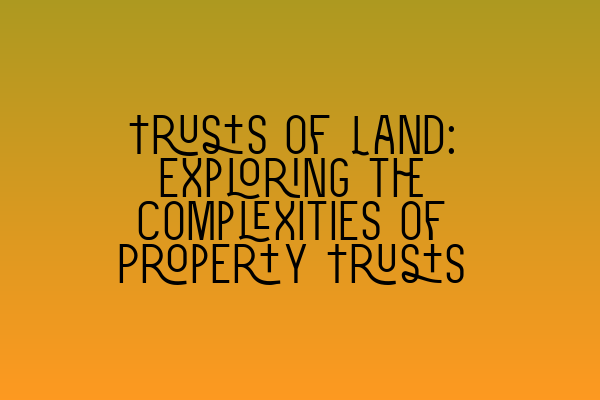Trusts of Land: Exploring the Complexities of Property Trusts
Welcome to SQE Property Law & Land Law, where we pride ourselves on providing expert advice and assistance in all matters related to property law. In this blog post, we will delve into the intricate world of property trusts, specifically focusing on trusts of land. Whether you are a solicitor, legal professional, or simply have an interest in property law, this article will provide valuable insights into the complexities of trusts of land.
Before we dive into the intricacies of property trusts, let’s briefly understand what a trust is. A trust is a legal arrangement where a person (known as the settlor) transfers assets or property to another person (known as the trustee) who holds and manages the assets for the benefit of someone else (known as the beneficiary). Trusts play a crucial role in property transactions, particularly when it comes to trusts of land.
The Basics of Trusts of Land
Trusts of land, as the name suggests, refer to trusts involving land or property. These types of trusts are governed by a set of legal principles that determine the rights and obligations of both the trustees and the beneficiaries. Understanding the complexities of trusts of land is essential for solicitors and legal professionals dealing with property transactions.
One key aspect to consider in trusts of land is the distinction between legal ownership and beneficial ownership. The legal owner holds the legal title to the land, but the beneficial ownership lies with the beneficiaries. This division is crucial in determining the rights and responsibilities of each party involved.
Types of Trusts of Land
Trusts of land can take various forms, each with its own nuances and implications. Some common types of trusts of land include:
- Bare Trusts: In a bare trust, the trustee holds the legal title to the property but has no powers or duties concerning the property. The beneficiary has full control and beneficial ownership of the property.
- Resulting Trusts: Resulting trusts arise when there is a failure of the intended trust arrangement. The property reverts back to the settlor or is held for the benefit of the settlor or another specified individual.
- Constructive Trusts: Constructive trusts are imposed by law to prevent unjust enrichment. They arise when a person holds property on behalf of another, even though there may be no formal trust arrangement in place.
These are just a few examples of the many types of trusts of land that exist. Each type has its own specific requirements and implications, making it essential for solicitors and legal professionals to have a thorough understanding of the intricacies involved.
The Importance of Expert Advice
Given the complexities and potential pitfalls associated with trusts of land, it is crucial to seek expert legal advice when dealing with such matters. At SQE Property Law & Land Law, we have a team of experienced solicitors who specialize in trusts of land. Our experts can provide you with the guidance and assistance needed to navigate through the intricacies of property trusts.
Whether you are a solicitor in need of professional support or an individual looking to understand trusts of land better, our team is here to help. We offer comprehensive SQE 1 and SQE 2 preparation courses to support legal professionals in their pursuit of excellence.
For those preparing for the SQE 1 exam, we offer practice exam questions and practice mocks FLK1 and FLK2 for a more effective and targeted preparation. Our SQE 2 preparation courses are also available for those looking to excel in the SQE 2 exam. Stay updated with the latest SRA SQE exam dates by checking our website regularly.
In conclusion, trusts of land are a complex area of property law that require careful attention and expertise. At SQE Property Law & Land Law, we pride ourselves on providing top-notch legal services and support to help you navigate through the complexities of property trusts. Contact us today to discuss your needs and learn how we can assist you in your property law matters.
